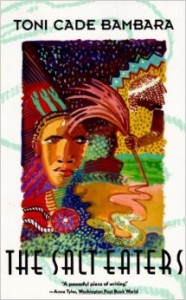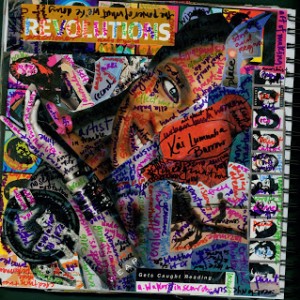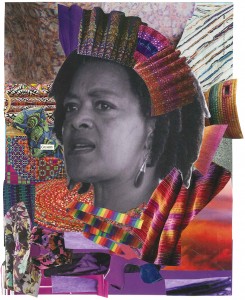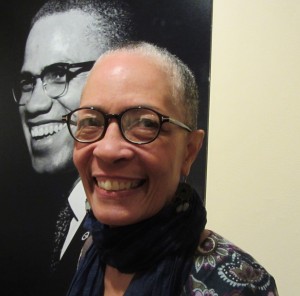One Thing: Toni Cade Bambara in the Speaking Everyday
By Alexis Pauline Gumbs on November 23, 2014Editors’ Note: Since this is a special forum celebrating the life, work, and legacy of Toni Cade Bambara, one of our ancestor heroines, TFW made the editorial decision to republish the slightly revised version of Alexis Pauline Gumbs’ “One Thing: Toni Cade Bambara in the Speaking Everyday,” originally published during a one-day mini-forum on March 25, 2014, which would have been Toni Cade Bambara’s 75th birthday.
Toni Cade Bambara is a life saver. Expert on Black women’s creative and spiritual practice, Akasha Gloria Hull says that Bambara’s enduring work The Salt Eaters induces and perhaps requires a mind altering state in order to allow a reader to be present to all the levels on which the text operates at once. I would add that the experience of reading Toni Cade Bambara’s work, hearing her voice, and living in a world that she has loved is a body-altering, spirit-altering, environment-altering experience. All at once.
I never knew Toni Cade Bambara personally, but her archival track record makes it clear to me that she was a kindred spirit. In her papers collected at the Spelman College archives you will see that she wrote poems and ideas on everything. Candy wrappers, napkins, post-cards about something else. Her writing existence reflected what seems to be the spiritual practice her life offered, the practice of revealing how our planet, our perception and our species, while seeming to exist in a billion disparate parts is one universe all connected. One story. All over the place.
At a historic writers retreat hosted by Essence Magazine and organized by the late great editor Cheryll Yvonne Greene in 1988, Toni Cade Bambara shared her vision for a book that she hoped her sister-writers would collaborate with her to create. This book, as she explained to the group of women gathered (which included Octavia Butler, Sonia Sanchez, Barbara Smith, Ntozake Shange, Julianne Malveaux, Lucille Clifton, and many more) would be more than an anthology. It would include poems and essays and stories, but also excerpts of legal proceedings, recipes, formulas, constellations. It is actually the most interdisciplinary and cross-genre book I have ever heard anyone imagine. As far as I know, the book never came to exist, but in form it again teaches us about Toni Cade Bambara’s worldview. Everything is relevant. Everything is connected.
Everything. So when The Salt Eaters or any of Toni Cade Bambara’s life-saving works fall off my bookshelf, or a scene from her literary creation shows up in my dream, or a number of people start mentioning her name to me, I think there is a message or at least an alert, urging me to go back to one of the most persistent lessons that The Salt Eaters offers me in this life. The message, lesson, reminder is this: my spiritual and physical well-being and the well-being of the community, planet and cosmos are ONE THING.
The Salt Eaters teaches us this through the story of Velma Henry (and her family, her community, the physical environment, the movement, the planet). Velma is someone that many of us can recognize. She is a champion for the people. She is a revolutionary artist who can’t sleep. Who doesn’t sleep. Who literally does not rest, because she believes to create any space of comfort for herself is to distract from the urgency of her work as an artist for the movement. So she works. Always. She is in it. Always. And she doesn’t rest until she involuntary falls down, and in the opening moment of the novel Velma Henry has fallen so hard that she is barely alive after a suicide attempt that requires the work of a healing community and a circle of ancestors and deities to gather in her name. This is the line we repeat again and again out of Toni Cade Bambara’s work, in the face of attempted suicide, the healer, Minnie Ransom asks, “Are you sure, sweetheart, that you want to be well?”
 That is the question that rings in my mind whenever Toni Cade Bambara’s books fall off the shelf, when her recordings get dislodged, when she is put, by no conscious action of my own in the front of my consciousness. And this is how she saves my life. When I finally went to therapy in the low point of my first grown-up break-up, my womanist miracle therapist asked me Minnie Ransom’s question. When I had convinced myself that dance was a luxury that I didn’t have time for in my busy and committed life, I found Toni Cade Bambara’s letter to fellow black feminist writer and visionary June Jordan about how their mutual friends seemed to be dying so fast and how she was trying to quit smoking, but the only times she could quit were when she was rigorously dancing. I don’t smoke, but I saw that as life-saving message for me. Now nothing gets in the way of my dance practice. Toni Cade made it clear. My life and the species are at stake. And when I was overwhelmed and wouldn’t admit it and filled my life with tasks in order to avoid my emotional reality and evolution, what was the one thing on my to-do list that finally made me stop and look at the disalignment between my love for the people and my critical, internalized capitalist, non-sustainable, workaholic relationship to myself and my time? An essay that I was supposed to be writing about The Salt Eaters. I just couldn’t get it done, because you can’t live like Velma Henry, and write about Velma Henry and not feel ancestral Toni Cade Bambara giving you the side-eye with her eyebrows raised.
That is the question that rings in my mind whenever Toni Cade Bambara’s books fall off the shelf, when her recordings get dislodged, when she is put, by no conscious action of my own in the front of my consciousness. And this is how she saves my life. When I finally went to therapy in the low point of my first grown-up break-up, my womanist miracle therapist asked me Minnie Ransom’s question. When I had convinced myself that dance was a luxury that I didn’t have time for in my busy and committed life, I found Toni Cade Bambara’s letter to fellow black feminist writer and visionary June Jordan about how their mutual friends seemed to be dying so fast and how she was trying to quit smoking, but the only times she could quit were when she was rigorously dancing. I don’t smoke, but I saw that as life-saving message for me. Now nothing gets in the way of my dance practice. Toni Cade made it clear. My life and the species are at stake. And when I was overwhelmed and wouldn’t admit it and filled my life with tasks in order to avoid my emotional reality and evolution, what was the one thing on my to-do list that finally made me stop and look at the disalignment between my love for the people and my critical, internalized capitalist, non-sustainable, workaholic relationship to myself and my time? An essay that I was supposed to be writing about The Salt Eaters. I just couldn’t get it done, because you can’t live like Velma Henry, and write about Velma Henry and not feel ancestral Toni Cade Bambara giving you the side-eye with her eyebrows raised.
It is happening again. I am writing this essay at the last minute. Ten minutes before Aishah has asked us to all push send, up early and dehydrated on the cold (March 25, 2014) 75th anniversary of Toni Cade Bambara’s birth. I have taken on supporting the loved ones of my late mentor to make sure her archival papers get where they need to go, I have taken on supporting my family and being present with my father as he faces some major health challenges that are killing the little girl part of me that insists he is immortal. And I am just continuing to say yes to everything. To the emails people send asking for advice, to the zillion tiny tasks of black feminism, to the favors, to the phone calls, to the revisions asked for, to the expectations offered every 4 minutes via smartphone to the self-identified-on-top-of-it-black-feminist-superhero-with-an-endless-well-of-ancestral-and-cosmic-love. I said yes to writing this very essay in the minutes before I go to my father’s hospital bed today. And guess what? The endless well of ancestral and cosmic love is saying look. Look what you are doing again.
I am breathing and remembering.
Alexis Pauline Gumbs, your breathing, your peace, your boundaries, your wellness is a crucial element, inecessary for your family, community and species, this is the practical way that the planet gets into balance and the universe gets to smile. Do not forget yourself in the midst. There is only one thing.
Maybe I am not the only person that needs to remember this at this moment. For sure I want to send some of this deep well of ancestral love, critique and cosmic love to my mentor-comrade Kai Barrow who has taught me so much about Toni Cade Bambara (and who was interviewed along with Aishah Shahidah Simmons, Linda Janet Holmes and others on the podcast I made for Toni Cade Bambara’s 71st birthday four years ago) in the form of a poem I wrote/heard that speaks in the model of a poem that Audre Lorde wrote for Toni Cade Bambara about ourselves and our children not having to be warriors every second of the day.
Thank you Toni Cade Bambara for your memory, for your wisdom and for your right-on-time reminders. You are present. You are everywhere. There is only one thing.
 To Lex and Kai Instead of a Letter of Congratulation
To Lex and Kai Instead of a Letter of Congratulation
after Audre Lorde’s Dear Toni Instead of a Letter of Congratulation Upon Your Book and Your Daughter Whom You Say You Are Raising To Be a Correct Little Sister
We can see you daughter
walking your own book of revelation
lifting your head
to do our jobs all over again
with pluck and affirmation.
But who did you make on the edge of Durham’s plantation
bright and brown and brave
while the inside grew and shuddered
shifting, choosing
were you remaking our tired capillaries
in a new city with a new game
with a new face scribbled with tears and laughter
or were you weaving a hammock into the gap
learning everything
even the old shit we ourselves tried to bury
and buried and burying need no more cover over?
We dig your slight frame extended
into crossroads as well as the invitation
to dance across
We dig your growing and becoming
as you rebirth
our loving
as you dig us
deep
shrines of paper.
But as you walk the old country
of our failures and our reasons
reach for your own sisters to keep you sharp
know us again and again
in their hands and faces
embrace them in strolls, in storm, in strollers.
If someone had told us we would all reunite in Durham
we would have thought they meant England or Durban and were drunk
who would have predicted you
in this place where stone walls silence spirits
schools spell spite and despair
you
too close to the dangerous predawn parties and intellectual gloom
would raise us
backward babes to your collective need.
We saw you behind book and book and notebook
defying silent white disbelief
that you could exist
beyond type or triptych
ghost of our rundown New York shoe treads on your heartbeat
we followed you to the land of devilish brightness
of cancerous research
knowing you needed what we didn’t want
to know
you studied our words like maps
but we were tracking you
whispering
how do these neighbors fall in love so easy
with her, with us, with themselves
soft, tough, crucial
direct your loving to the ground here
grow up
rooted in a handstand with your upside-down faith
you who have indulged yourself
five hundred sheets of paper
scared perhaps to shift to choose to stop.
Or perhaps umbilically relieved.
Durham does not remind us of home
but we too love the tentative and unlikely
the way that love makes grooves to walk around in
that love that leaves you wanting to come back
and so we move
through you
lustful and waiting left of your heart
over your hoop dodging head.
Know beyond fear or history
keep trust with less and less pages
walk across yourself
and find us tending the same pains.
In our daughter’s names
we bless you with the life you have
with a future of prophecy and affirmation
but with pause and careful questions also.
If we are landscapes
printed on your markered hands
we are also feathers etched into your stony path.
Live in your own black woman contradiction
coming to love it
as we love you.
Alexis Pauline Gumbs is a queer black troublemaker, a Black feminist love evangelist and a prayer poet priestess. Alexis has been blessed by Toni Cade Bambara both through her published work, her archival papers at Spelman College and her impact on the lives of sister/mother/comrades Cheryll Y. Greene, Aishah Shahidah Simmons, Cara Page and Kai Barrow. She honors the legacy of Toni Cade Bambara by taking self-care seriously, committing to “sister” as a verb, writing “out-there” short stories, creating spaces for transformative Black Feminist filmmaking and crafting a life as a community accountable scholar and artist in Durham, NC. For more information, please visit: http://www.alexispauline.com
You may also like...
2 Comments
All Content ©2016 The Feminist Wire All Rights Reserved







Pingback: Black Blessings: Toni Cade Bambara and Octavia E. Butler - The Feminist Wire | The Feminist Wire
Pingback: Afterword: Toni Cade Bambara's Living Legacy - The Feminist Wire | The Feminist Wire